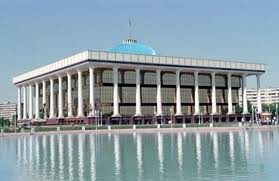Uzbek Parliamentary Delegation Visits Carleton

The Institute of European, Russian and Eurasian Studies at Carleton University, in collaboration with the Clayton H. Riddell Graduate Program in Political Management, was pleased to host a roundtable on “Parliamentary Development in Uzbekistan and the Canadian model” on April 17, 2013. This roundtable featured members of the Legislative Chamber of the National Assembly (Oliy Majlis) in Uzbekistan, who visited Canada from April 15 until April 22. The delegation of Uzbek Parliamentarians was comprised of:
- Diloram Tashmukhamedova, Speaker, Legislative Chamber of the Oliy Majlis of Uzbekistan;
- Abdugafor Mamatov, Chairman, Committee on the Issues of Science, Education, Cultural and Sport of the Legislative Chamber;
- Alisher Akramov, Member, Committee on Agriculture and Water Management of the Legislative Chamber;
- Shavkat Teshayev, Member, Committee on Budget and Economic Reforms of the Legislative Chamber; and
- Dilorom Fayzieva, Member, Committee on International Affairs and Inter-Parliamentary Relations of the Legislative Chamber.
Diloram Tashmukhamedova discussed the progress of democratic development in Uzbekistan. According to Speaker Tashmukhamedova, the “Uzbek Model” of democratic development revolves around five core principles; de-ideologization of the economy, making the state institutions the leaders of the reform process, ensuring the rule of law, implementing a strong social policy and maintaining consistency throughout the reform period. Despite the progress made thus far, the crucial step in deepening democratic reform and ensuring Uzbekistan will continue along the path of democratic reform will be adapting the necessary legal mechanisms. For example, through the adoption of the appropriate legislation the role and place of political parties in Uzbekistan has changed. Political parties are now seen as an essential tool for increasing citizen’s participation in the political process as well as their important role of being the executive and representative bodies in Parliament.
As democratic reforms progress in Uzbekistan, knowledge exchanges to various established Western democracies, such as Canada, provide the Uzbek government with insight into how these established democracies have stabilized their political systems. Therefore, the purpose of this visit to Canada as highlighted by Speaker Tashmukhamedova’s speech was to experience firsthand and learn how a stable democracy, like Canada, functions. Through the exchange of ideas over the course of the week, the Uzbek delegation hoped to apply this knowledge in Uzbekistan. Additionally, the Uzbek delegation indicated that their visit to Canada would be helpful in intensifying Canadian-Uzbek parliamentary cooperation.
During the question and answer period, the Uzbek delegation faced questions from the audience centered around the large issues facing Uzbekistan, namely the environmental degradation of the Aral Sea and the impact this has on relations with neighbouring countries as well as on domestic agriculture. Overall, the Uzbek delegation, during Speaker Tashmukhamedova’s speech and in the question and answer period, pointed out how much our two countries can learn from each other, and the value of maintaining Uzbekistan’s good relations and cooperation with Canada.
All those in attendance were granted the unique opportunity to hear firsthand about the ongoing process of democratic development in Uzbekistan from the perspective of Uzbek Parliamentarians.